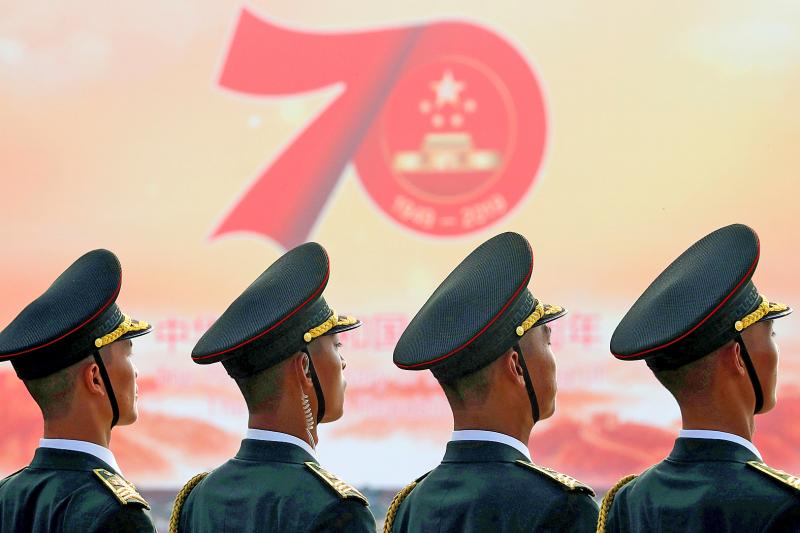Urgent measures are needed to strengthen the credibility of US military deterrence of any potential Chinese aggression against Taiwan, a report released on Wednesday by a bipartisan advisory body to the US Congress said.
The US-China Economic and Security Review Commission included a range of recommendations about Taiwan in its annual report to Congress, amid heightened tensions between Taiwan and China.
Congress should take either legislative or administrative action to “resist any resort to force that would jeopardize the security of Taiwan” in accordance with the US’ Taiwan Relations Act, it said.

Photo: Reuters
Congress should authorize and appropriate funds for Taiwan to purchase defense articles from the US and finance the deployment of cruise and ballistic missiles and other munitions in the Indo-Pacific region, while increasing funding for surveillance, it said.
“A lack of clarity in US policy could contribute to a deterrence failure if Chinese leaders interpret that policy to mean opportunistic aggression against Taiwan might not provoke a quick or decisive US response,” the report added.
Chinese Communist Party (CCP) leaders remain deeply concerned about the uncertain success of an attempted invasion against Taiwan because failed attempts by the Chinese People’s Liberation Army (PLA) “to invade Taiwan or to counter US intervention risk undermining the CCP’s legitimacy,” it said.
However, the report said that Beijing’s “increasingly coercive approach to Taiwan puts almost daily pressure on the cross-strait status quo and increases the potential for a military crisis.”
The PLA “has already achieved the capabilities needed to conduct an air and naval blockade, cyberattacks and missile strikes against Taiwan,” the report said, estimating that it could at present carry an initial landing of 25,000 or more troops on Taiwan.
Under these circumstances, it has become less certain that US conventional military forces alone would continue to deter China’s leaders from initiating an attack on Taiwan, it said.
The report also addressed a range of economic issues between the US and China, including recommending that Congress consider legislation to address risks to US investors and interests in China investment.
China’s capital controls “may limit investors’ abilities to move money out of equity and bond investments, and the lack of oversight by trusted authorities may jeopardize investors’ funds,” commission chairwoman Robin Cleveland said in an opening statement. “More importantly, numerous companies which will benefit from US investment have been formally identified as threats to US national security interests.”
The report recommends prohibiting or at least better identifying the risks of variable interest entities, where Chinese companies create offshore corporate entities to circumvent China’s prohibitions on foreign direct investment in certain industries and list on US exchanges.
The report said that US participation in China’s financial markets was increasing — reaching as much as US$1.2 trillion last year — and “outpacing the US government’s defense” against threats posed by problematic Chinese companies.
The US administration has prohibited investment in 24 publicly traded Chinese companies, but commissioners Jeffrey Feidler and Michael Wessel said that “many more should be on the list.”
Additional reporting by CNA

CHAOS: Iranians took to the streets playing celebratory music after reports of Khamenei’s death on Saturday, while mourners also gathered in Tehran yesterday Iranian Supreme Leader Ayatollah Ali Khamenei was killed in a major attack on Iran launched by Israel and the US, throwing the future of the Islamic republic into doubt and raising the risk of regional instability. Iranian state television and the state-run IRNA news agency announced the 86-year-old’s death early yesterday. US President Donald Trump said it gave Iranians their “greatest chance” to “take back” their country. The announcements came after a joint US and Israeli aerial bombardment that targeted Iranian military and governmental sites. Trump said the “heavy and pinpoint bombing” would continue through the week or as long

TRUST: The KMT said it respected the US’ timing and considerations, and hoped it would continue to honor its commitments to helping Taiwan bolster its defenses and deterrence US President Donald Trump is delaying a multibillion-dollar arms sale to Taiwan to ensure his visit to Beijing is successful, a New York Times report said. The weapons sales package has stalled in the US Department of State, the report said, citing US officials it did not identify. The White House has told agencies not to push forward ahead of Trump’s meeting with Chinese President Xi Jinping (習近平), it said. The two last month held a phone call to discuss trade and geopolitical flashpoints ahead of the summit. Xi raised the Taiwan issue and urged the US to handle arms sales to

State-run CPC Corp, Taiwan (CPC, 台灣中油) yesterday said that it had confirmed on Saturday night with its liquefied natural gas (LNG) and crude oil suppliers that shipments are proceeding as scheduled and that domestic supplies remain unaffected. The CPC yesterday announced the gasoline and diesel prices will rise by NT$0.2 and NT$0.4 per liter, respectively, starting Monday, citing Middle East tensions and blizzards in the eastern United States. CPC also iterated it has been reducing the proportion of crude oil imports from the Middle East and diversifying its supply sources in the past few years in response to geopolitical risks, expanding

Pro-democracy media tycoon Jimmy Lai’s (黎智英) fraud conviction and prison sentence were yesterday overturned by a Hong Kong court, in a surprise legal decision that comes soon after Lai was jailed for 20 years on a separate national security charge. Judges Jeremy Poon (潘兆初), Anthea Pang (彭寶琴) and Derek Pang (彭偉昌) said in the judgement that they allowed the appeal from Lai, and another defendant in the case, to proceed, as a lower court judge had “erred.” “The Court of Appeal gave them leave to appeal against their conviction, allowed their appeals, quashed the convictions and set aside the sentences,” the judges